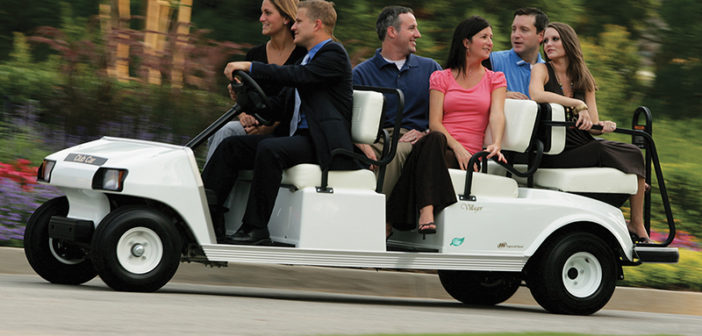AUGUSTA, GA—With the influx of large resorts spanning the size of small cities, guests can find it tiring to walk from one side of the property to the other.
Club Car, based here, provides electric- and gas-powered vehicles to hotels and resorts for shuttling guests, as well as transporting maintenance and housekeeping staff. Some of the company’s vehicles are even capable of driving on streets that have low speed limits.
Augusta is home to the Professional Golfers’ Association (PGA) of America’s annual Masters tournament, one-quarter of the sport’s Grand Slam. So it was almost a given that Club Car first rose to prominence as a manufacturer of golf carts.
“In 1962, Bill Stevens took the wheel of a four-year-old golf-car manufacturer in Texas, relocated it to Augusta and started the engine of the company known as Club Car,” said Sammy Crawford, product manager, light transport, Club Car. “The company shifted into high gear in 1978, when eight executives at what was then the world’s largest golf-car manufacturer resigned and purchased Club Car. They immediately extended the product line by creating the first utility vehicle in 1984, the original Carryall utility vehicle.”
The company, which has since become the world’s largest manufacturer of small-wheel electric vehicles (EVs), according to Crawford, began offering transport vehicles to hotels in the mid-1990s. “We were already manufacturing renowned DS golf cars and our Carryall utility vehicles that were used by many fine resorts, and we were determined to meet their need for transport vehicles as well,” he said.
For the hospitality industry, Club Car offers gasoline- and electric-powered Villager and Transporter vehicles, as well as Villager street-legal, low-speed vehicles (LSVs), which, Crawford noted, can navigate narrow paths that may be inaccessible to larger vehicles.
“The four-, six- or eight-passenger Villager offers flexible passenger and cargo configurations that make them ideal for moving guests to and from the spa and other resort amenities,” he said. “Unlike many competitive vehicles, the Villager 6 and 8 models accommodate a stake side for carrying luggage, making them a good choice for concierge service. Four- and six-passenger Transporters can also be used for guest transport and concierge service, and are ideal for shuttling guests to and from parking areas. The Transporter 4 is often used for housekeeping crews because it carries two crews and their gear and can accommodate standard or customized housekeeping packages.”
He added, “Our Villager LSVs carry two or four passengers and can be used for site tours and other applications.”
Gasoline models on both Villagers and Transporters feature a fuel-efficient, 14-horsepower single-cylinder overhead cam engine that delivers outstanding gas mileage, power and torque, according to Crawford. “Most competitive vehicles do not have EFI [electronic fuel injection], which can make them less energy-efficient, less powerful and hard to start in cold weather,” he added.
The Villager and Transporter EVs feature 48V battery packs with eight 6V batteries that “deliver a longer range than 48V battery packs with six 8V batteries, which many shuttles have,” noted Crawford. “Both vehicles feature smart, on-board chargers and front cord retractors that make it easy for crews to charge at any 110V outlet, something most electric shuttles don’t offer. The chargers issue alerts that prevent common user errors and uncharged cars.”
Other features include hand-held diagnostics (on the Transporter, Villager 6 and Villager 8 models) and zero-speed detect. “The diagnostic tool can be plugged into the car to provide information on usage and help technicians diagnose and repair problems,” said Crawford. “Zero-speed detect helps prevent roll away, and the speed can be controlled as low as 5 mph (8 km/h) via programming and speed key options.”
According to Crawford, Club Car serves hundreds of hotels and resorts, including many owned by Ritz-Carlton, Four Seasons, Wyndham, MGM and Sheraton, providing transport vehicles to both urban hotels and resorts that are located in more rural areas. “Since resorts generally have larger footprints and more amenities than hotels, they tend to use more transport vehicles.”
One such resort is Hawks Cay Resort, Villas and Marina in Duck Key, FL. The 60-acre property—which features a 177-room main hotel, 250 villas, a 7,000-sq.-ft. spa, a marina, several restaurants and other amenities—uses a fleet of 55 electric and three gas-powered Club Car vehicles. They are used for facilities maintenance, housekeeping and guest transport.
“We are very pleased with the vehicles,” said Lenny Petraska, the resort’s chief engineer. “We love the durable aluminum frames and the ERIC chargers. We’re getting good power and a lot of use between charges.
“Our preventive maintenance schedule is much better now,” he added. “The single-point watering system makes battery maintenance easy and prevents overwatering.” His employees can now water a car in a minute; it took 20 minutes per car without the system. The resort uses primarily Carryall utility vehicles and Villager Transport vehicles; the latter are used to transport guests around the property, noted Petraska.
While the Hawks Cay Resort, Villas and Marina uses its fleet of vehicles to transport guests, some Club Car clients are able to use their vehicles on public roadways. “Our Villager LSVs are street-legal in most states on roads with speed limits of 35 mph or less. Our larger Villagers and Transporters may be street-legal on roads within a resort compound. This depends on local and state regulations,” said Crawford.
Traditionally, hotels and resorts have purchased their Club Car fleets, but Crawford has found there has been a growing movement of late for leasing the vehicles. “Leasing often offers advantages over purchasing, such as tax deductions for lease payments, lower monthly payments and overall costs,” he said. “Also, since most leases run for three to four years, they can keep vehicles under warranty much of the time. This reduces maintenance costs and lets resorts upgrade fleets more frequently. Our primary leasing partner, DLL Financial Solutions, offers a variety of flexible leasing options. It can even arrange different terms for different models of vehicles, as well as leases that require no payments during off-season.”
Crawford also noted that both the electric and gasoline vehicles, which feature four-year limited warranties, “are easy to maintain, with little need to go under the vehicle or remove components. Our EFI engines have fewer moving parts than other engines and longer intervals between preventive maintenance schedules.”
Club Car clients are generally happy with the transport vehicles “because of their durability and reliability,” said Crawford. “One thing that makes our vehicles so popular with resorts is our exclusive aircraft-grade rustproof aluminum frame that can withstand the salty air, water and chemicals in many resort environments. Also, many resorts already use Club Car Precedent golf cars and Carryall utility vehicles, so using our transport vehicles lets them deal with a single vendor. Our sales professionals are trained to help resorts develop comprehensive transportation plans that can build safety into a fleet and avoid fleet-management problems downstream.” HB


